PROMETHAZINE - INJECTION
PHONETIC PRONUNCIATION: (pro-METH-uh-zeen)
COMMON BRAND NAME(S): Phenergan
GENERIC NAME(S): promethazine HCl
Uses
USES: Promethazine is used to prevent and treat nausea and vomiting related to certain conditions (such as before/after surgery, motion sickness). It is also used with other medication to treat severe allergic reactions (anaphylaxis) and reactions to blood products. It may also be used to treat milder allergic reactions when you cannot take promethazine by mouth. It may also be used to help you feel sleepy/relaxed before and after surgery, during other procedures, or during labor and delivery. It may also be used to help certain narcotic pain relievers (such as meperidine) work better. Promethazine is an antihistamine and works by blocking a certain natural substance (histamine) that your body makes during an allergic reaction. Its other effects (such as anti-nausea, calming, pain relief) may work by affecting other natural substances (such as acetylcholine) and by acting directly on certain parts of the brain. This drug is not approved for use in children younger than 2 years due to an increased risk of side effects (such as slow/shallow breathing). See also Warning section.
How to use PROMETHAZINE - INJECTION
HOW TO USE: See also Warning section. It is best to inject this medication deep into a muscle. It may also be given by injection slowly into a large vein by a health care professional. Do not inject this medication under the skin or into an artery. For nausea and vomiting, use this medication as directed by your doctor, usually every 4 hours as needed. If you have any questions about the proper use of this medication, ask your doctor or pharmacist. If you are using this medication at home, learn all preparation and usage instructions from your health care professional. Before using, check this product visually for particles or discoloration. If either is present, do not use the liquid. Learn how to store and discard medical supplies safely. The dosage and how often you receive this medication are based on your age, medical condition, and response to treatment. In children, the dosage may also be based on weight. Do not increase your dose or use this medication more often or for longer than prescribed. Your condition will not improve any faster, and your risk of side effects will increase. Tell your doctor if you do not get better or if you get worse.
Side Effects
Precautions
Interactions
Overdose
Images
Reviews
Faq for PROMETHAZINE - INJECTION
Promethazine injection is used to treat nausea and vomiting associated with surgery or certain medical conditions.
Promethazine is an antihistamine that blocks the effects of histamine, a chemical released by the body that can cause allergic reactions, including nausea and vomiting.
Promethazine injection is typically administered into a vein (intravenous) or into a muscle (intramuscular) by a healthcare professional.
Common side effects may include drowsiness, dizziness, blurred vision, dry mouth, constipation, or headache. Rare but serious side effects may include difficulty breathing, irregular heartbeat, or seizures.
Promethazine injection should only be used during pregnancy if the potential benefits outweigh the potential risks. It is important to consult with a healthcare provider before using this medication.
Promethazine injection can be used in children, but the dose should be determined by their healthcare provider based on the child's age and weight.
Promethazine injection may interact with certain medications, including opioids, sedatives, and tranquilizers. It is crucial to inform your healthcare provider about all the medications you are taking before receiving promethazine injection.
Promethazine injection typically begins to work within 20 minutes of administration, but the exact onset of action may vary from person to person.
If you miss a dose of promethazine injection, contact your healthcare provider for further instructions. It is important not to double the dose to make up for a missed one.
Warning
WARNING: Promethazine should not be used in children younger than 2 years because it may cause serious (possibly fatal) slow/shallow breathing. When using this medication in children 2 years and older, use the lowest effective dosage and avoid other drugs that affect breathing. Get medical help right away if slow/shallow breathing occurs. In children, drugs for nausea should only be used in cases of prolonged vomiting of a known cause. Avoid use of promethazine in children with liver disease (including possible Reye's syndrome). This medication can cause severe tissue damage, possibly requiring surgery. Tell your health care professional right away if you have burning, pain, redness, swelling, or numbness at or near the injection site. If this occurs, the injection should be stopped and the injection site checked. It is preferred that this medication be given by injection into a muscle. There may be an increased risk of side effects if this medication is given by injection into a vein. This medication must not be given by injection under the skin.
Disclaimer
IMPORTANT: HOW TO USE THIS INFORMATION: This is a summary and does NOT have all possible information about this product. This information does not assure that this product is safe, effective, or appropriate for you. This information is not individual medical advice and does not substitute for the advice of your health care professional. Always ask your health care professional for complete information about this product and your specific health needs.

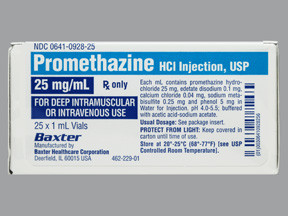
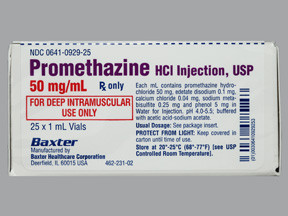
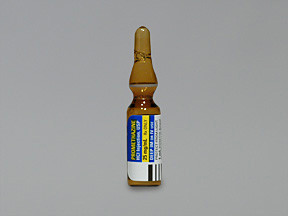
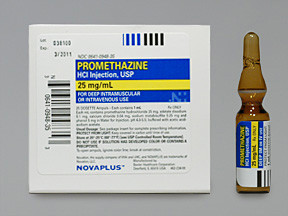
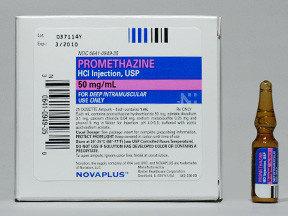
No Reviews Yet